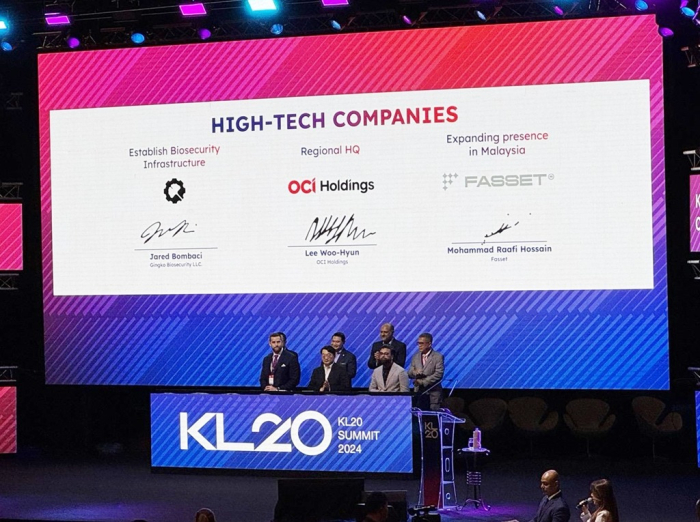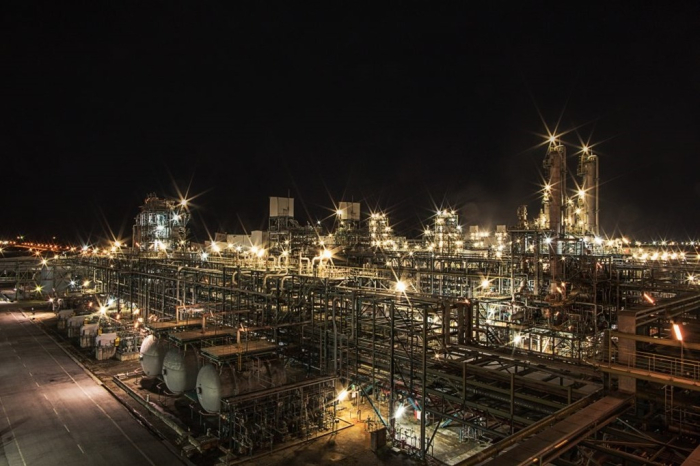Energy
OCI to invest up to $1.5 bn in Malaysia’s polysilicon plant
OCIM, the South Korean company’s Malaysian unit, is a key beneficiary of US sanctions on Chinese polysilicon
By Apr 23, 2024 (Gmt+09:00)
1
Min read
Most Read
LG Chem to sell water filter business to Glenwood PE for $692 million


Kyobo Life poised to buy Japan’s SBI Group-owned savings bank


KT&G eyes overseas M&A after rejecting activist fund's offer


StockX in merger talks with Naver’s online reseller Kream


Mirae Asset to be named Korea Post’s core real estate fund operator



KUALA LUMPUR -- OCI Holdings Co., South Korea’s leading chemical and green energy company, plans to invest up to 2 trillion won ($1.5 billion) in Malaysia to increase the manufacturing capacity of the polysilicon for solar panels and expand its product portfolios into the polycrystalline silicon for semiconductors.
OCI said it agreed with the Malaysian government on Monday to spend 850 billion won by 2027 to raise the capacity of polysilicon for solar panels of OCIM Sdn. Bhd., its wholly-owned subsidiary in the Southeast Asian country, to 56,000 tons a year from the current 35,000 tons.
The South Korean company also said it aims to manufacture polysilicon for semiconductors there through partnerships with global companies, which is likely to boost the investments to 2 trillion won.
“We are enjoying continuous orders from global companies, which seek low-carbon products, as we operate the factory with hydroelectric power,” said OCI Chairman Lee Woo-hyun at the KL20 Summit 2024, the Malaysian government-organized event to attract investment in Kuala Lumpur.
“We aim to expand business areas through cooperation with not only the government but also global companies.”
BENEFITS FROM US SANCTIONS ON CHINESE POLYSILICON
OCIM has been a major beneficiary of the US sanctions on Chinese polysilicon. Washington effectively banned the imports of solar modules made of raised silicon material from China under the Uyghur Forced Labor Prevention Act (UFLPA) in July last year.
OCIM also took advantage of Malaysia’s incentives to attract foreign investments.

The government exempts corporate taxes for foreign companies building new factories in the country for 10 years and extends the benefit if they invest in adding capacities. Electricity is supplied at less than half the prices in South Korea through long-term contracts.
Thanks to the policy, OCIM logged an operating profit of 531 billion won last year despite fierce competition against Chinese rivals, which provided low-cost products.
Write to Woo-Sub Kim at duter@hankyung.com
Jongwoo Cheon edited this article.
More to Read
-
 EnergyOCI signs $1 billion polysilicon supply deal with US solar firm CubicPV
EnergyOCI signs $1 billion polysilicon supply deal with US solar firm CubicPVDec 19, 2023 (Gmt+09:00)
3 Min read -
 EnergyUS OKs Chinese-made solar modules using materials of S.Korea's OCI
EnergyUS OKs Chinese-made solar modules using materials of S.Korea's OCISep 25, 2023 (Gmt+09:00)
1 Min read -
 Chemical IndustryOCI to jointly produce polysilicon for chips with Japanese company
Chemical IndustryOCI to jointly produce polysilicon for chips with Japanese companyMay 24, 2023 (Gmt+09:00)
1 Min read -
 EnergyOCI to expand polysilicon line, buy back shares to boost corporate value
EnergyOCI to expand polysilicon line, buy back shares to boost corporate valueMar 19, 2023 (Gmt+09:00)
5 Min read
Comment 0
LOG IN


